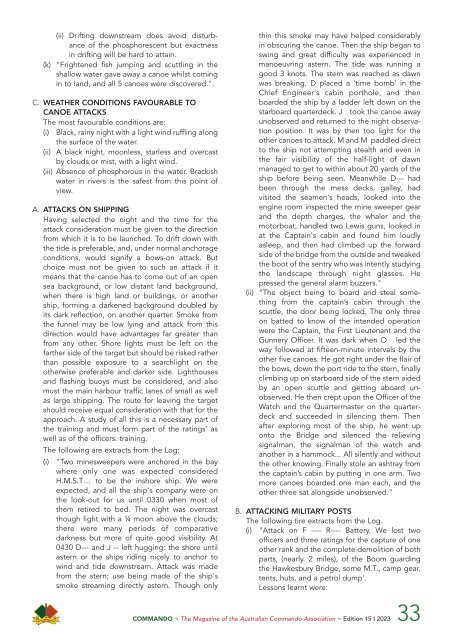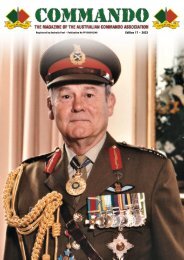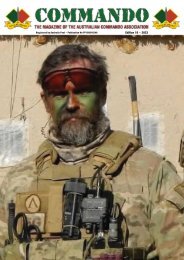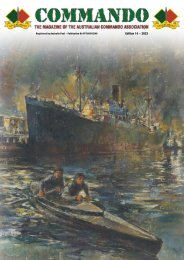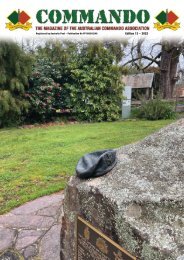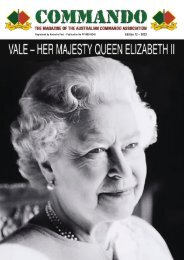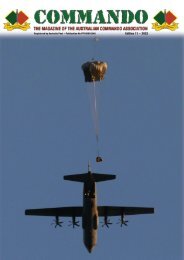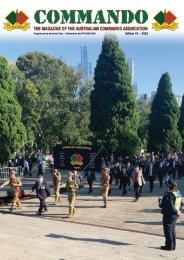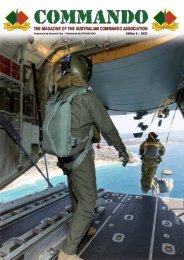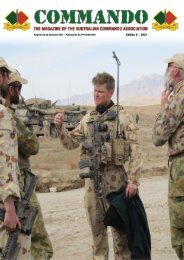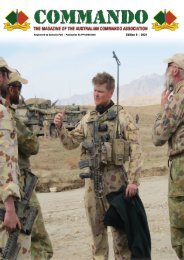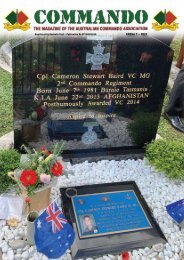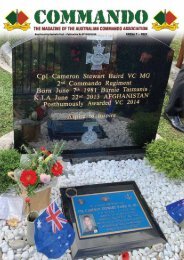OFFICIAL Commando News Magazine Edition 15 2023
The official magazine of the Australian Commandos Association
The official magazine of the Australian Commandos Association
Create successful ePaper yourself
Turn your PDF publications into a flip-book with our unique Google optimized e-Paper software.
(ii) Drifting downstream does avoid dis turb -<br />
ance of the phosphorescent but exactness<br />
in drifting will be hard to attain.<br />
(k) "Frightened fish jumping and scuttling in the<br />
shallow water gave away a canoe whilst coming<br />
in to land, and all 5 canoes were discovered.".<br />
C. WEATHER CONDITIONS FAVOURABLE TO<br />
CANOE ATTACKS<br />
The most favourable conditions are:<br />
(i) Black, rainy night with a light wind ruffling along<br />
the surface of the water.<br />
(ii) A black night, moonless, starless and overcast<br />
by clouds or mist, with a light wind.<br />
(iii) Absence of phosphorous in the water. Brackish<br />
water in rivers is the safest from this point of<br />
view.<br />
A. ATTACKS ON SHIPPING<br />
Having selected the night and the time for the<br />
attack consideration must be given to the direction<br />
from which it is to be launched. To drift down with<br />
the tide is preferable, and, under normal anchorage<br />
conditions, would signify a bows-on attack. But<br />
choice must not be given to such an attack if it<br />
means that the canoe has to come out of an open<br />
sea background, or low distant land background,<br />
when there is high land or buildings, or another<br />
ship, forming a darkened background doubled by<br />
its dark reflection, on another quarter. Smoke from<br />
the funnel may be low lying and attack from this<br />
direction would have advantages far greater than<br />
from any other. Shore lights must be left on the<br />
farther side of the target but should be risked rather<br />
than possible exposure to a searchlight on the<br />
otherwise preferable and darker side. Lighthouses<br />
and flashing buoys must be considered, and also<br />
must the main harbour traffic lanes of small as well<br />
as large shipping. The route for leaving the target<br />
should receive equal consideration with that for the<br />
approach. A study of all this is a necessary part of<br />
the training and must form part of the ratings’ as<br />
well as of the officers. training.<br />
The following are extracts from the Log:<br />
(i) "Two minesweepers were anchored in the bay<br />
where only one was expected considered<br />
H.M.S.T… to be the inshore ship. We were<br />
expected, and all the ship's company were on<br />
the look-out for us until 0330 when most of<br />
them retired to bed. The night was overcast<br />
though light with a ¼ moon above the clouds;<br />
there were many periods of comparative<br />
darkness but more of quite good visibility. At<br />
0430 D--- and J -- left hugging: the shore until<br />
astern or the ships riding nicely to anchor to<br />
wind and tide downstream. Attack was made<br />
from the stern; use being made of the ship's<br />
smoke streaming directly astern. Though only<br />
thin this smoke may have helped considerably<br />
in obscuring the canoe. Then the ship began to<br />
swing and great difficulty was experienced in<br />
manoeuvring astern. The tide was running a<br />
good 3 knots. The stern was reached as dawn<br />
was breaking. D placed a 'time bomb' in the<br />
Chief Engineer's cabin porthole, and then<br />
boarded the ship by a ladder left down on the<br />
starboard quarterdeck. J took the canoe away<br />
unobserved and returned to the night observa -<br />
tion position. It was by then too light for the<br />
other canoes to attack. M and M paddled direct<br />
to the ship not attempting stealth and even in<br />
the fair visibility of the half-light of dawn<br />
managed to get to within about 20 yards of the<br />
ship before being seen. Meanwhile D--- had<br />
been through the mess decks, galley, had<br />
visited the seamen's heads, looked into the<br />
engine room inspected the mine sweeper gear<br />
and the depth charges, the whaler and the<br />
motorboat, handled two Lewis guns, looked in<br />
at the Captain's cabin and found him loudly<br />
asleep, and then had climbed up the forward<br />
side of the bridge from the outside and tweaked<br />
the boot of the sentry who was intently studying<br />
the landscape through night glasses. He<br />
pressed the general alarm buzzers."<br />
(ii) “The object being to board and steal some -<br />
thing from the captain’s cabin through the<br />
scuttle, the door being locked. The only three<br />
on batted to know of the intended operation<br />
were the Captain, the First Lieutenant and the<br />
Gunnery Officer. It was dark when O led the<br />
way followed at fifteen-minute intervals by the<br />
other five canoes. He got right under the flair of<br />
the bows, down the port ride to the stern, finally<br />
climbing up on starboard side of the stern aided<br />
by an open scuttle and getting aboard un -<br />
observed. He then crept upon the Officer of the<br />
Watch and the Quartermaster on the quarter -<br />
deck and succeeded in silencing them. Then<br />
after exploring most of the ship, he went up<br />
onto the Bridge and silenced the relieving<br />
signal man, the signalman of the watch and<br />
another in a hammock... All silently and without<br />
the other knowing. Finally stole an ashtray from<br />
the captain’s cabin by putting in one arm. Two<br />
more canoes boarded one man each, and the<br />
other three sat alongside unobserved."<br />
B. ATTACKING MILITARY POSTS<br />
The following tire extracts from the Log.<br />
(i) "Attack on F ---- R---- Battery. We lost two<br />
officers and three ratings for the capture of one<br />
other rank and the complete demolition of both<br />
parts, (nearly. 2 miles), of the Boom guarding<br />
the Hawkesbury Bridge, some M.T., camp gear,<br />
tents, huts, and a petrol dump'.<br />
Lessons learnt were:<br />
COMMANDO ~ The <strong>Magazine</strong> of the Australian <strong>Commando</strong> Association ~ <strong>Edition</strong> <strong>15</strong> I <strong>2023</strong> 33


